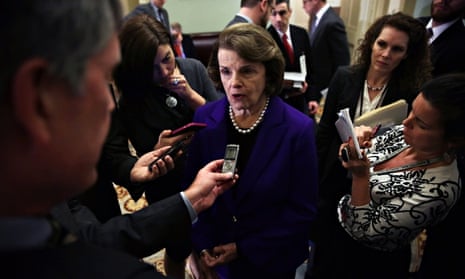President Ronald Reagan signed the United Nations convention against torture in 1988 and the United States ratified it six years later in 1994. Seven years after that, in 2001, the US nevertheless started to use torture on a systematic basis. That use continued for several years. In 2009 the practice was banned by President Obama. On Tuesday, the full story of America’s shame and disgrace was at last laid bare. It is one of the darkest episodes in the history of a nation that sees itself, not unreasonably in many respects and in some eras, as a beacon to the world.
The Senate intelligence committee’s report is a landmark in accountability. Yet it also shows how much remains to be done to tighten the rule of law over the necessary secret agencies of the state, and not only in America. The report provides devastating evidence of the CIA’s consistent and deliberate recourse to torture, with the blessing of the Bush administration, following the 9/11 attack, and in pursuit of the so-called war on terror. It pulls few punches as it details the conscious and repeated subversion of law and justice by a state that is justly proud to be rooted in those very ideals. It is one of the most shocking documents ever produced by any modern democracy about its own abuses of its own highest principles.
In one sense, it is a tribute to the US that it has published such a report. It is certainly a huge contrast to the cosy inadequacy of UK policy, practice and accountability – shortcomings that parliament must address. But it is a report about state crimes that should never have been committed, should never have been authorised, should never have been ignored by the US’s allies – and which remain unpunished. Moreover, the report has only been published now because, next month, a change of political control in the US Senate would have led to its suppression by the Republicans.
The Senate’s decision to publish the report – or rather the 400-page redacted summary that appeared on Tuesday; the full 6,000-page classified version remains secret – should not cause outrage, as some have already tried to claim. But its contents must do so – in the US and among its allies, including Britain. The report calls the treatment of at least 119 detainees in US custody brutal, involving waterboarding, hooding, slamming against walls, slapping, rectal “rehydration”, iced-water immersion, sleep deprivation for periods of more than a week (usually shackled, standing and naked), other sensory deprivations and threats of violence to detainees’ families. Interrogations were given precedence over medical care. As Mr Obama has acknowledged, this was torture. As Senator Dianne Feinstein, chair of the committee, said on Tuesday, the programmes were “morally and legally misguided” and embodied “brutality in stark contrast to our values as a nation”.
Torture was not just wrong, but ineffective. The report is at its most forensic in showing, including in some UK cases, that torture did not produce evidence that was critical to stopping real plots. President Bush once said that “waterboarding saved American lives”. He was simply wrong. It may even have cost American lives as the backlash against US methods surged around the globe.
The torture programme was bad enough. But the CIA also lied about it. It lied about it to the American people. But it also lied about it within government too. CIA directors gave inadequate information to the White House. But the feuding White House kept key members of the administration, including Colin Powell, out of the loop anyway. Within government, and even within the CIA, criticisms were blocked and critics marginalised. Attempts by Congress at oversight were rebuffed, especially once concerns had been aroused about conditions in Guantánamo Bay, Abu Ghraib and elsewhere. The administration and the agency – along with parts of US civil society – were in the grip of a groupthink that said the 9/11 attack justified the use of torture and that the war on terror justified covering it up.
The question now is whether enough will change. In the 1970s, the CIA responded to criticism by pulling down the shutters and building up the secret state further. Today, Americans face the challenge of stopping a repeat. The moral and practical authority of the democratic system around the world depends in no small part on them succeeding.
